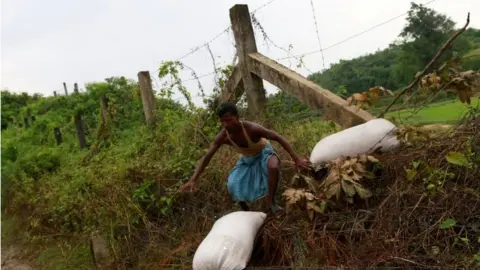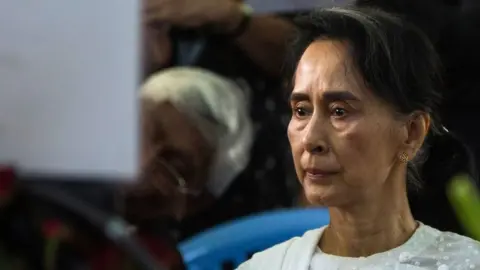Rohingya crisis: Myanmar 'mining border' as refugees flee
 Reuters
ReutersBangladesh has summoned the Myanmar ambassador in Dhaka to protest against the planting of landmines along the border between the two countries.
It comes amid growing tensions over the huge influx of Rohingya Muslims fleeing violence in Myanmar.
A senior official in Bangladesh said they believed Myanmar government forces were planting the landmines to stop the Rohingya returning to their villages.
But a Myanmar military source said no landmines had been planted recently.
The BBC's Sanjoy Majumder, who is on the Bangladeshi side of the border, said there had been at least three injuries caused by landmines this week.
When asked whether Bangladesh had lodged a complaint about the mines, Foreign Secretary Shahidul Haque said "yes" but did not elaborate further.
The UN has said the number of Rohingya refugees crossing from Myanmar into Bangladesh has surged since 25 August.
It says more than 146,000 Rohingya have fled violence in Myanmar's Rakhine state, in the northwest of the country.
The conflict was triggered by an attack by Rohingya militants on police posts.
Following the attack there was an outbreak of violence which has sent waves of refugees fleeing the country, also called Burma.
 AFP/Getty Images
AFP/Getty ImagesTwo Bangladeshi government sources told Reuters news agency they believe Myanmar has been laying fresh landmines along the border, despite the flood of refugees trying to cross to safety.
The area was mined in the 1990s, during military rule, to prevent trespassing.
On Monday, a spokesman for Mymanmar's de facto leader, Aung San Suu Kyi, questioned who exactly had placed the explosives.
"Who can surely say those mines were not laid by the terrorists?" Zaw Htay asked Reuters.
Ms Suu Kyi claimed that the crisis is being distorted by a "huge iceberg of misinformation" and said tensions were being fanned by fake news promoting the interests of terrorists.
She made the comments in a phone call with Turkish President Recep Tayyip Erdogan, her office said.
On Wednesday, President Erdogan said Turkey would provide 10,000 tonnes of aid to help Rohingya Muslims who have fled the violence in Myanmar.
He said the Turkish aid agency, TIKA, was already delivering this aid to camps for the displaced.
There have also been outpourings of support in Indonesia, but some of Myanmar's neighbours - including Bangladesh - have come under criticism for not doing more to deal with the crisis.
Bangladesh has previously refused to recognise the Rohingya as refugees, with Amnesty International accusing the country of sending people back to Myanmar to face an uncertain future.
Earlier this year, the government in Dhaka suggested relocating all Rohingya refugees to a low-lying island vulnerable to flooding and without roads in the Bay of Bengal.
